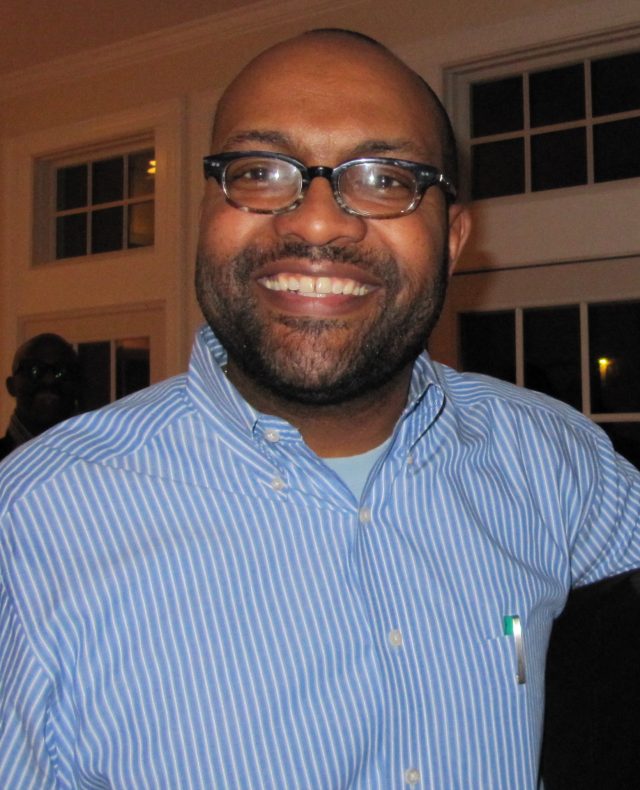Renowned author and playwright Jabari Asim will be in Madison on Friday at Madison’s Central Library as part of a series for the Wisconsin Book Festival. At 7pm on Friday, Asim will give a reading and engage the audience in a talk about his new book, entitled “We Can’t Breathe”.
“We Can’t Breathe” is a series of essays Asim wrote about different aspects of the story for black survival. While the slogan “I can’t breathe” stemmed from specific incidents involving police killing young black males, Asim’s book is not the result of those specific incidents. Rather, it is a portrait of what it means to be black in spaces and places, physically and emotionally.
 The experience of being in a body with black skin is in itself an incident. In Madison, Asim will unquestionably find an audience of people of color who relate to the experiences he has had in becoming self-aware about the impact his skin color has not just on other people, but on himself.
The experience of being in a body with black skin is in itself an incident. In Madison, Asim will unquestionably find an audience of people of color who relate to the experiences he has had in becoming self-aware about the impact his skin color has not just on other people, but on himself.
“I’m interested in what reception I’m going to get when I enter a space as a black man,” Asim told Madison365. “That’s something I call Discreet Citizenship. A black person in a space is always believed to be bigger than he or she actually is. So I consider the way in which we make ourselves smaller or quieter to make it a more comfortable space for white people.”
For people of color living in predominantly white areas like Madison, the act of literally making oneself smaller and quieter is suffocating. There’s no space to breathe. It’s not only suffocating but, Asim points out, it’s physically restricting in some felt way.
“I think about the degree to which I avoid physical contact or standing out in some way,” Asim says. “Because if something goes wrong I will be implicated. Even if i had nothing to do with it.”
Perhaps worse than being falsely implicated would be the feeling that no one would listen if a black person did try to speak out. In “We Can’t Breathe,” Asim takes on the notion that how we speak as black people (and, to be frank, white progressives…) needs to change.
“If you make yourself a Sheep, the Wolves will eat you” was a quote from Benjamin Franklin that Asim uses in “We Can’t Breathe” during a discussion about ending the timidity that people of color are forced to fight against white supremacy with. If a person of color, especially an African-American man, is too blunt, he’s just another angry black man. Too meek, and he’s basically a tool for White America.
But Asim is choosing the blunt route. Asim encourages readers to join the narrative combat that is taking place in the United States today. Are we, as black people, telling our own stories? Are we using our own voices? Are we speaking in language that is straight forward?
Asim’s book tackles a litany of historical ways in which the intellect, demeanor and rights of blacks have been marginalized but he also thinks it is important to draw parallels between historical events and what is happening right now.
Asim cites the treatment that University of Louisville student Shiya Nwanguma went through at a Trump rally. Nwanguma was repeatedly shoved, screamed at and accosted by white Trump supporters who were inflamed towards the young black woman.
Nwagnuma’s treatment reminds Asim of how difficult it must have been for people like Melba Pattillo Beals, who was 14 years old when she became one of the first students to integrate an all-white high school in Little Rock. Beals says she had acid thrown in her eyes and faced daily hostility just moving around the high school.
For Asim, those incidents are important but the feelings involved and what they are about is the thing he wants us to have a discourse on.
“I’m hesitant to pin it on a specific incident because an incident is unfolding right now as we are talking,” Asim said about the impetus for his book. “I thought a lot about the Charleston shooting. The discussion that the media feels compelled to have with black victims, asking black victims if they are able to forgive their white assailants. I’m struck by that. I looked at Shiya Nwanguma, a young black woman at a Trump rally and Trump was saying Get her out, Get her out and they were surrounding her. And I tried to draw a parallel between that and a girl who tried to integrate a Little Rock school. So it’s Black people moving through White spaces. I think it’s a particular experience to inhabit a Black body.”
Asim will be at Madison’s Central Library at 7 pm in community rooms 301-302 on Friday, October 26.




























